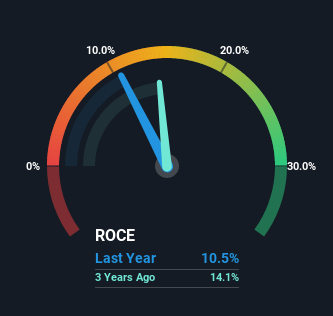- Malaysia
- /
- Wireless Telecom
- /
- KLSE:MAXIS
Maxis Berhad (KLSE:MAXIS) Is Finding It Tricky To Allocate Its Capital

When it comes to investing, there are some useful financial metrics that can warn us when a business is potentially in trouble. Typically, we'll see the trend of both return on capital employed (ROCE) declining and this usually coincides with a decreasing amount of capital employed. This combination can tell you that not only is the company investing less, it's earning less on what it does invest. And from a first read, things don't look too good at Maxis Berhad (KLSE:MAXIS), so let's see why.
What Is Return On Capital Employed (ROCE)?
Just to clarify if you're unsure, ROCE is a metric for evaluating how much pre-tax income (in percentage terms) a company earns on the capital invested in its business. To calculate this metric for Maxis Berhad, this is the formula:
Return on Capital Employed = Earnings Before Interest and Tax (EBIT) ÷ (Total Assets - Current Liabilities)
0.11 = RM1.8b ÷ (RM23b - RM5.3b) (Based on the trailing twelve months to June 2022).
Thus, Maxis Berhad has an ROCE of 11%. In absolute terms, that's a satisfactory return, but compared to the Wireless Telecom industry average of 8.5% it's much better.
Check out our latest analysis for Maxis Berhad

Above you can see how the current ROCE for Maxis Berhad compares to its prior returns on capital, but there's only so much you can tell from the past. If you'd like, you can check out the forecasts from the analysts covering Maxis Berhad here for free.
What Can We Tell From Maxis Berhad's ROCE Trend?
We are a bit worried about the trend of returns on capital at Maxis Berhad. To be more specific, the ROCE was 18% five years ago, but since then it has dropped noticeably. And on the capital employed front, the business is utilizing roughly the same amount of capital as it was back then. This combination can be indicative of a mature business that still has areas to deploy capital, but the returns received aren't as high due potentially to new competition or smaller margins. So because these trends aren't typically conducive to creating a multi-bagger, we wouldn't hold our breath on Maxis Berhad becoming one if things continue as they have.
In Conclusion...
In the end, the trend of lower returns on the same amount of capital isn't typically an indication that we're looking at a growth stock. Long term shareholders who've owned the stock over the last five years have experienced a 19% depreciation in their investment, so it appears the market might not like these trends either. With underlying trends that aren't great in these areas, we'd consider looking elsewhere.
If you want to continue researching Maxis Berhad, you might be interested to know about the 2 warning signs that our analysis has discovered.
While Maxis Berhad isn't earning the highest return, check out this free list of companies that are earning high returns on equity with solid balance sheets.
New: Manage All Your Stock Portfolios in One Place
We've created the ultimate portfolio companion for stock investors, and it's free.
• Connect an unlimited number of Portfolios and see your total in one currency
• Be alerted to new Warning Signs or Risks via email or mobile
• Track the Fair Value of your stocks
Have feedback on this article? Concerned about the content? Get in touch with us directly. Alternatively, email editorial-team (at) simplywallst.com.
This article by Simply Wall St is general in nature. We provide commentary based on historical data and analyst forecasts only using an unbiased methodology and our articles are not intended to be financial advice. It does not constitute a recommendation to buy or sell any stock, and does not take account of your objectives, or your financial situation. We aim to bring you long-term focused analysis driven by fundamental data. Note that our analysis may not factor in the latest price-sensitive company announcements or qualitative material. Simply Wall St has no position in any stocks mentioned.
About KLSE:MAXIS
Maxis Berhad
An investment holding company, provides a suite of converged telecommunications, digital, and related services and solutions in Malaysia and internationally.
Fair value with moderate growth potential.

